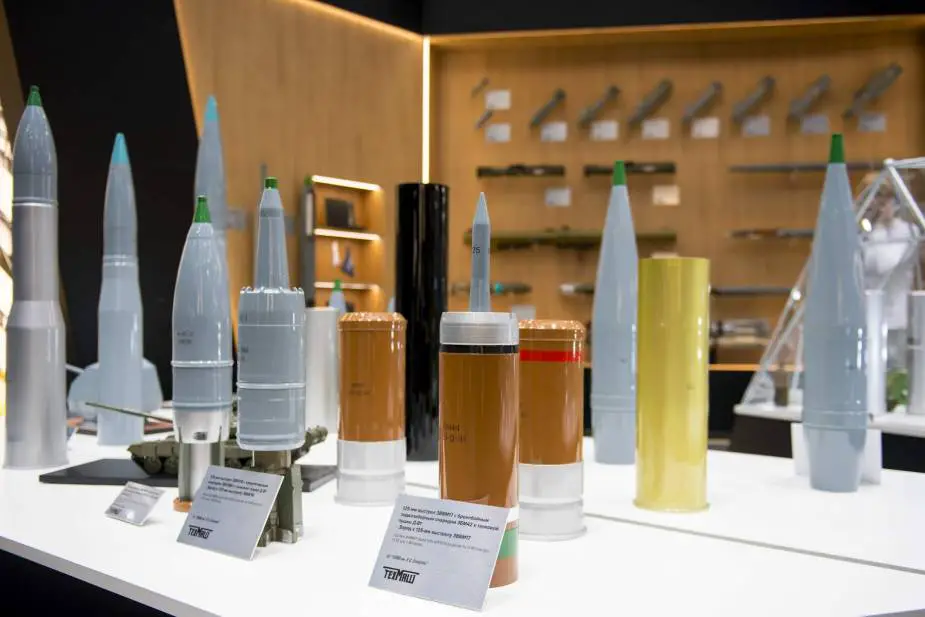Design and production of munitions are priority for Russian armed forces – Part 5
In a major lack of time and materials for precision munitions, rational combination of experimental and theoretical methods for reliable forecast of characteristics becomes vital. It is specifically important at the stage of optimization of experimental testing and calculated estimates of munition parameters and fuzes. It is also necessary to rationally unify the results of experiments at the stage of design of similar-caliber munitions for various weapons.
Follow Army Recognition on Google News at this link

Tecmash high-penetration armor-piercing sabot tank shells displayed at the International Military-Technical Forum Army-2019. (Picture source: Rostec/Anton Tushin)
Timely creation of the scientific and technical potential for R&D becomes vital. It includes selection and assessment of the obtained results of fundamental and applied research, forecasts and designs in the form of new scientific knowledge about physical-chemical phenomena, laws and regularities for the creation of new precision munitions; military and dual technologies; new materials and substances; electronic component base of munitions, modules and blocks; algorithms and computer software; experimental munitions, including non-traditional ones; tactical and technical assignments for R&D; conceptual, normative, technical, methodological and other documents.
The above-listed provisions and an upgrade of the industry determine the tasks of the modern state of human resources engaged in the design of munitions and working at munition enterprises. The human resource is a key short and long-term issue of the creation of munitions and arming the troops with them.
Experts suggest including into the arms program a section on munitions and explosives. The section should analyze the needs of the armed forces and provide a systemic approach and unify the tasks in order to satisfy the current needs of the armed forces and other bodies; create mobilization reserves of munitions, explosives, mixtures, materials, etc.; and deliver them for civilian industries (mining).
Another proposal calls to abandon the Bologna Process in training munition specialists. It is necessary to fully restore and develop the Russian method of training engineers and provide a combination of a good general education and vocational training. Education in the form of bachelor’s degree does not provide an adequate response to R&D needs and personnel requirements of enterprises. It decreases the educational level of engineers engaged in munitions. It can trigger serious negative consequences, as such specialists cannot ensure the required characteristics of munitions.
It is necessary to consider state orders for training of specialists for the military-defense complex, increase the attractiveness for future students by a higher scholarship and bonuses from the Defense Ministry. New normative documents have to be drafted to promote interaction of universities and leading defense enterprises to improve the training process. They have to reflect the commitment to provide modern technical literature, documents and samples of munitions to universities.
As specialists are unwilling to work in munitions industry and the military-industrial complex in general, it is appropriate to discuss and introduce two levels of education at the federal level for engineers: firstly, (national certification system at the expense of the budget) for goal-oriented training of specialists for government-owned and defense enterprises, who have to work there for at least 3-5 years; secondly, (international paid certification) training of students, who plan to career in commercial companies. Bachelor’ and post-graduate education is likely to be an acceptable form.
It is necessary to stop outsourcing managers by enterprises of the industry. At least ten years of employment are necessary to occupy managing positions by specialists, who were not trained in the output of the enterprise, and five years for specialists trained in the business, PhD Technical Science V. Selivanov, PhD Technical Science V. Veldanov, and PhD Technical Science retired Colonel Yu. Ilyin write in the Voennaya Mysl (Military Thought) journal.
© Copyright 2021 TASS / Army Recognition Group SPRL . All rights reserved. This material may not be published, broadcast, rewritten or redistributed.


























